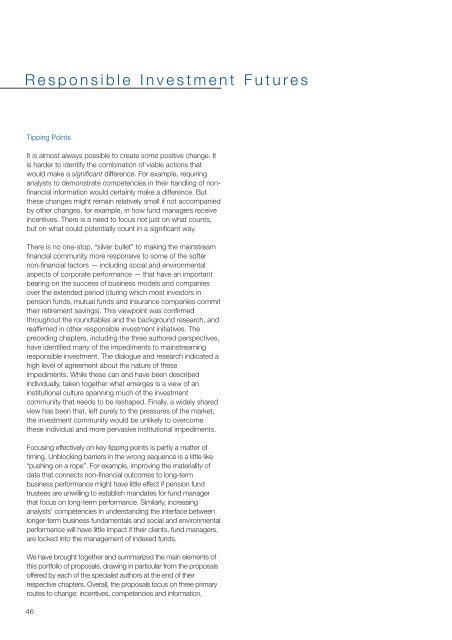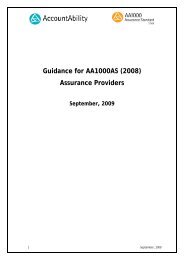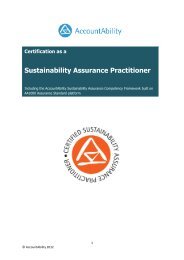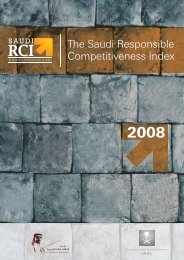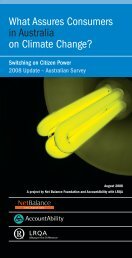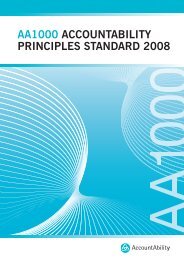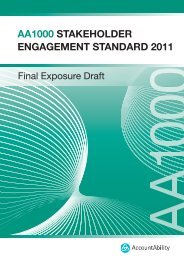Mainstreaming Responsible Investment - AccountAbility
Mainstreaming Responsible Investment - AccountAbility
Mainstreaming Responsible Investment - AccountAbility
Create successful ePaper yourself
Turn your PDF publications into a flip-book with our unique Google optimized e-Paper software.
<strong>Responsible</strong> <strong>Investment</strong> Futures<br />
Tipping Points<br />
It is almost always possible to create some positive change. It<br />
is harder to identify the combination of viable actions that<br />
would make a significant difference. For example, requiring<br />
analysts to demonstrate competencies in their handling of nonfinancial<br />
information would certainly make a difference. But<br />
these changes might remain relatively small if not accompanied<br />
by other changes, for example, in how fund managers receive<br />
incentives. There is a need to focus not just on what counts,<br />
but on what could potentially count in a significant way.<br />
There is no one-stop, “silver bullet” to making the mainstream<br />
financial community more responsive to some of the softer<br />
non-financial factors — including social and environmental<br />
aspects of corporate performance — that have an important<br />
bearing on the success of business models and companies<br />
over the extended period (during which most investors in<br />
pension funds, mutual funds and insurance companies commit<br />
their retirement savings). This viewpoint was confirmed<br />
throughout the roundtables and the background research, and<br />
reaffirmed in other responsible investment initiatives. The<br />
preceding chapters, including the three authored perspectives,<br />
have identified many of the impediments to mainstreaming<br />
responsible investment. The dialogue and research indicated a<br />
high level of agreement about the nature of these<br />
impediments. While these can and have been described<br />
individually, taken together what emerges is a view of an<br />
institutional culture spanning much of the investment<br />
community that needs to be reshaped. Finally, a widely shared<br />
view has been that, left purely to the pressures of the market,<br />
the investment community would be unlikely to overcome<br />
these individual and more pervasive institutional impediments.<br />
Focusing effectively on key tipping points is partly a matter of<br />
timing. Unblocking barriers in the wrong sequence is a little like<br />
“pushing on a rope”. For example, improving the materiality of<br />
data that connects non-financial outcomes to long-term<br />
business performance might have little effect if pension fund<br />
trustees are unwilling to establish mandates for fund manager<br />
that focus on long-term performance. Similarly, increasing<br />
analysts’ competencies in understanding the interface between<br />
longer-term business fundamentals and social and environmental<br />
performance will have little impact if their clients, fund managers,<br />
are locked into the management of indexed funds.<br />
We have brought together and summarized the main elements of<br />
this portfolio of proposals, drawing in particular from the proposals<br />
offered by each of the specialist authors at the end of their<br />
respective chapters. Overall, the proposals focus on three primary<br />
routes to change: incentives, competencies and information.<br />
46


